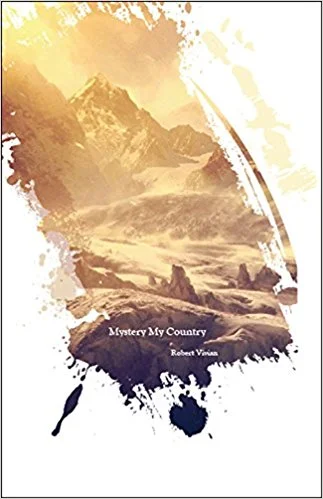NEAL GILBERT REDMAN
Review of Robert Vivian's Mystery My Country
While the work collected in Robert Vivian’s Mystery My Country would more traditionally be called prose poems, he calls them dervish essays—which comes closer to describing the experience of reading them. The essays dash and change in a fascination not unlike the whirling dance of the Sufis, whose bodies and skirts spin in repetitive circles, an act that desires to lose the self and connect with creation.
Calling them dervish essays also labels the experience of listening to them, which I was able to do as a student at the Vermont College of Fine Arts when I saw Vivian perform several of them. He would step to the podium, and it would somehow transform into an altar as he began to read. He would read in a frenzy that was somehow measured, rushing with sudden pauses at words and phrases that came suddenly, weighty perfections, before proceeding headlong, rolling and tumbling, racing through the essay.
While reading Vivian’s essays, the effect of his style can almost make you feel out of control, but his language is too sure for that, too energized and connected: no matter how quickly you race along, each word just locks into place. In “Windblown Wonder,” Vivian rapidly shifts from one concept to the next, building from one to the other, spiraling around the title for the piece:
. . . this page is a windblown wonder and holy writ whose scribe is coming down the home stretch with ears pinned back for flying and more love-most than he knows what to do or be with, oh, the page, the page! the torn out page from a book of trees and how the willows ache with weeping and the splendid pages falling everywhere flashing semaphores in the sun, the holy signals turning this way and that, page full of nonsense and page full of praise and page that keeps going like a banshee on the loose . . . . (44)
In his headlong race from one experience to the next, Vivian frequently returns to the same imagery—the act of writing, ink on the page, fish in a river—and sometimes it feels like too much, like he’s repeating himself. But these images are in conversation with one another, almost mantra-like, changing along with you, leading you to new visions and meditations each time you return to them.
Everything about Mystery My Country is flat-out joyful, longing for connection with the world, even things that aren’t so wonderful—lost plastic bags caught in trees and fences, the cracked lips of a man wandering the edge of a highway, combines devouring large swathes of fields “with the calm ferocity of marauding bees” (“Combines in the Dark” 51). Like a modern-day Rumi or Whitman (comparisons that are impossible to avoid), Vivian makes you fall in love with the world. There are some who will find this comforting in a time that feels ever more chaotic, but it’s something we’re constantly in need of—the world is always spinning with lines of division ready to be drawn. The voice telling you to let go, look outward, speak with that other human even when all you want to do is stay home with the deadbolt drawn—that voice never stops being needed.
Two particular essays embody Vivian’s ability to make us want to connect with the world while still acknowledging that it isn’t always wonderful. Both “Lullaby” and “Mercy, Mercy” are soft and gentle, but tremble on the edge of a known darkness. “Lullaby” takes comfort in the quiet breathing of a child sleeping, a daughter resting, before growing to encompass ancestors who watch and whisper over the child that “all shall be well,” before evoking a siren in the night, coming for a man clutching his heart—someone who may join the ancestors soon or may yet have more days with babes who breath sweetly in the evening. In “Mercy, Mercy,” we feel the terror of a boy who has broken his arm in the woods, but the fear somehow transmutes into something wonderful, something peaceful:
. . . little boy who has broken his arm in the woods and must cradle the hurt offering many miles amazed at his pain as he walks and sometimes tries to run under the listening trees as his broken arm somehow feeds the leaves above turning them ever greener as they breathe back mercy, mercy and the fish hold down at the bottom of the river where the current is slower, letting the holy syllables rush over them in the cold, dark water. (14)
Both of these essays hold the same mystery that lives at the heart of this collection: life is full of incongruous and inhospitable things, where food stamps and litter somehow inhabit the same space as young girls singing Paul McCartney’s “Silly Little Love Song.” Our everyday experience sometimes founders on these differences. But in Mystery My Country, Vivian embraces this incongruity: there is desire, there is pain, there is love—and there is beauty in them all.
Neal is an Assistant Professor of Writing at the University of Minnesota Duluth and a graduate of the Vermont College of Fine Arts MFA program. He loves all types of writing, but particularly fiction writing that has a strong voice. If it includes some speculative elements (such as magical realism), that's even better.
